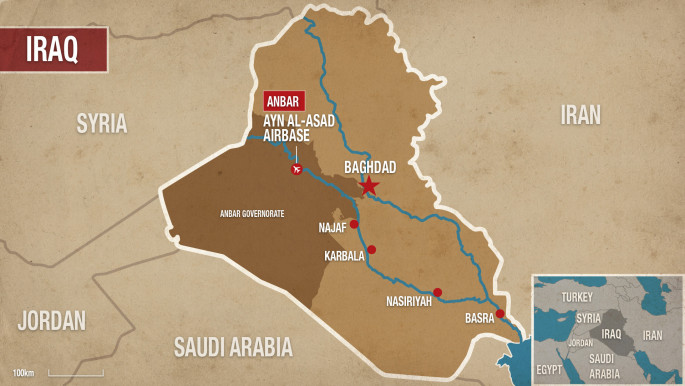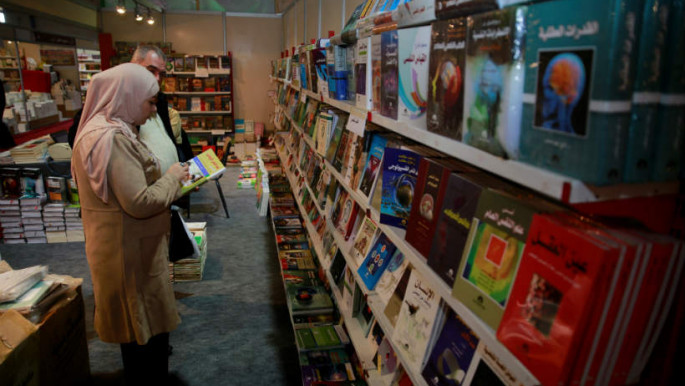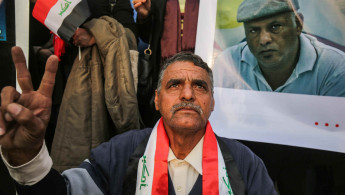The Iraq Report: Iran critics assassinated as calls mount for US troops to leave Iraq
Although US President Donald Trump has frequently emphasised the need for US troops to return home, he has now made it clear that does not apply to troops in Iraq.
According to Trump, US soldiers are needed in Iraq in order to watch over Iranian activities in the region - leading to criticism from Iraqi politicians and threats from pro-Iran militias to once again start targeting US military personnel.
As the main Shia Islamist factions who won the most seats in last May's legislative elections come closer to an agreement to finally complete the formation of a cabinet, Iraqi activists and writers who oppose Iran's presence in their country have again come into the crosshairs.
Considering the campaign pledges of Iraq's election winners to curb "outside interference", the assassinations of Iran critics in the country is unlikely to inspire public confidence and will likely lead to greater feelings of being under an informal occupation.
Trump insists US troops will stay 'to watch Iran'
Speaking to American broadcaster CBS on Superbowl Sunday, President Donald Trump walked back on his commitment to bring as many US troops back home as possible, announcing that he intended to maintain an American military presence in the Ayn al-Asad Airbase in Iraq's Anbar governorate.
According to Trump, the 5,000 troops at the "unbelievable and expensive" airbase would be tasked with keeping an eye on nearby Iran so the US could be pre-warned in case of an Iranian attempt to develop a nuclear weapon. The troops would also be reinforced with the 2,000 soldiers set to be withdrawn from Syria at an unspecified time in the future.
Trump's announcement drew fire from a number of Iraqi officials and pro-Iran figures.
Iraqi President Barham Salih said on Monday that Washington had not asked Iraq for permission to watch Iran, and decried the US attempt to over-ride Iraqi sovereignty. Salih is a senior member of the Patriotic Union of Kurdistan (PUK) party that enjoys close ties with Iran.
"Don't overburden Iraq with your own issues," Salih said. "The US is a major power… but do not pursue your own policy priorities; we live here."
 |
Hassan al-Kaabi, the deputy parliamentary speaker, and a close ally of Shia cleric and election-winner Muqtada al-Sadr, told AFP Trump's latest remarks were a "new provocation", and the Sadrist bloc had already begun drafting proposed bills to force US troops to leave.
Officially, Iraq claims there are no US bases on Iraqi soil, and only admits to the presence of "instructors" deployed at Iraqi owned-and-operated bases. However, a high-level Iraqi government source told The New Arab’s Arabic-language edition on Monday that an investigation was currently being held by parliament to determine the exact number of American soldiers in Iraq and their mission.
"Members of parliament's security, defence and foreign relations committees are now working hard to determine the exact number and real mission of the US forces in Iraq," the source said.
While pro-Iran militias have threatened to actively target and kill US troops, they have now issued a guarantee to Prime Minister Adel Abdul Mahdi that they will refrain from attacking US forces. Their decision likely follows Iranian desires not to further provoke Washington after Tehran announced successfully testing a new cruise missile with a range of more than 1,350 kilometres. If true, this would give Iran the capability to strike Israel, the main US ally in the region.
Analysts have suggested the troops at the airbase are too far from the Iranian border to be able to effectively monitor Iran, while others have argued that Trump's anti-Iran stance appears to be disingenuous given that his administration actively supports a pro-Iran politician, Adel Abdul Mahdi, in his post as prime minister.
Iran critics fear assassination threat in Iraq
One criticism of the Trump and previous US administrations is that their stated desire to curb Iranian influence and power is undermined by their inaction when critics of Iran within Iraq are actively targeted and killed.
As such, cross-sectarian civil society groups are afraid to openly stand against Iranian interests that undermine Iraqi sovereignty for fear of reprisals, effectively killing any opposition to Tehran's ambitions.
Last Saturday, Iraqi novelist and writer Alaa Abboud was gunned down outside his home in Karbala, despite heavy security in the Shia holy city and numerous checkpoints apparently designed to keep armed Sunni militants such as the Islamic State group from conducting sectarian attacks.
In a vicious attack that was described as an "assassination" by the Gulf Centre for Human Rights (GCHR), Abboud was shot 13 times by his assailants before they fled the scene. No arrests have been made, though the police have stated that they are investigating the murder.
Speaking to the Associated Press, Abboud's brother, Qassim Abboud, said he believed the Iran-backed Popular Mobilisation Forces (PMF), an umbrella group of dozens of mainly Shia Islamist militias, were responsible for his brother's killing. Abboud was a known critic of Iran and was known to condemn Shia militias for their sectarian violence, racketeering, and behaving as though they were above the law.
While previously it was assumed that pro-Iran groups would target predominantly Sunni Arab activists in what was always seen as sectarian violence, it is now becoming increasingly clear that even Shia Arab activists who want an independent and sovereign Iraq are not safe.
This could already be seen in the protests that swept across predominantly Shia areas in southern Iraq last summer, including major cities such as Basra, Najaf, Karbala and Nasiriyah. Prominent Shia activists and demonstrators such as Souad al-Ali, a mother of four who helped organise the anti-corruption demonstrations and a known critic of Iranian interference, were also killed in targeted assassinations.
The brutal messages these militias are sending is clear - any criticism of Iran will not be tolerated, and no-one, not even the state, can protect those exercising their right to free speech.
 |
| This week also saw the opening of the Baghdad International Book Fair [Anadolu] |
Shia Islamists close to ending government deadlock
The Iraqi government is still labouring under a political crisis that has seen empty seats in the cabinet almost a year after Iraqis turned out in record low numbers to vote.
However, the two principal election winners, Sairoun, led by Sadr, and the PMF-linked Conquest List, led by Hadi al-Amiri, appear to be on the cusp of securing a deal to end the rift and finally complete the formation of a government cabinet.
The two sides had been at odds over who controlled powerful and well-funded ministries in a political game of tug-of-war that has lasted for months. The post of interior minister has caused the greatest consternation, with the Sadrists refusing to appoint the PMF's secretary and national security adviser Faleh al-Fayyadh.
The interior ministry, which controls the federal police and several intelligence services, has traditionally been controlled by the Iran-backed Badr Organisation - which Amiri leads. Iraq's political system is one of patronage where control over well-funded ministries means political groups and powerful militias can use government funds to provide jobs, including in the police force, to their loyal men while sidelining others.
This has led to the federal police being predominantly staffed by Shia Islamist militants.
Keen to curb Fayyadh's growing influence and power - this is a man who was recently used by the Syrian Assad regime to deliver messages to Saudi Arabia - the Sadrists said they would not make a deal that included him. With the announcement of the continuation of a US presence on Iraqi soil, the two sides came together to condemn Washington and the Conquest List offered a climbdown on Fayyadh and promised to suggest other candidates for the Sadrists' approval.
Speaking to The New Arab, a source close to the talks said both sides had already agreed the broad outlines of how to move forward and "the establishment of joint committees to place the final touches [on the agreement]".
While Sadr has recently undergone a makeover as an Iraqi nationalist icon, as has Amiri and other leading members of the Conquest List, he too has received extensive Iranian backing. Tehran's support allowed him to form the notorious Mahdi Army militia that was responsible for some of the worst sectarian violence during the American occupation.
Sadr is also seeking to complete his religious education in Iran, which would grant him greater legitimacy among the Shia faithful beyond his heritage.
As such, it is important when assessing internal Iraqi power dynamics and disputes to consider them as competing agendas with closely related spheres of influence rather than being necessarily diametrically opposed interests to one another.



